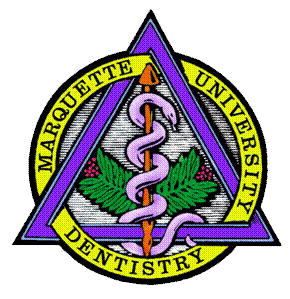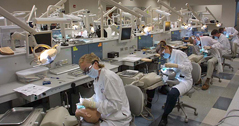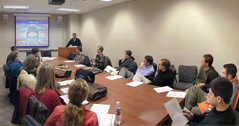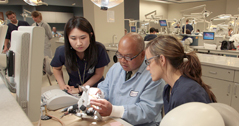Policies and Regulations
Dental students are responsible for complying with the regulations and/or procedures of the School of Dentistry, as described in such documents as the Handbook on Academic Policies and Procedures, Clinic Operations Manual and Comprehensive Patient Care Group Manual, as well as those set forth in the At Marquette student handbook. Copies of these can be found online. Violations of regulations found in At Marquette will be handled by the Office of Student Development. Copies of At Marquette can be obtained at the Office of Student Development. If there is a conflict between the two applicable regulations or procedures, the School of Dentistry regulation/procedure will govern. If there are multiple components to a case, the components of the case may be separated and reviewed independently by the appropriate authority (e.g., School of Dentistry, Office of Student Development).
Background Checks, Drug Testing
Marquette University School of Dentistry and its affiliated educational programs may require a student to submit to a criminal background check and/or drug testing. The results of those checks and/or tests may affect the student’s eligibility to continue in that degree and/or course.
Commencement
Attendance at Commencement exercises is obligatory for all members of the graduating class. Permission to be absent will only be granted for compelling reasons. Such requests must be submitted to the dean in writing by May 1. The dean will forward the request for final action to the provost of the university.
Students, who are in good academic standing, have met the appropriate graduation application deadline and will complete their degree requirements including the official recording of any transfer work, by the end of the summer term may participate in spring commencement. Such students may participate in selected May commencement ceremonies in the School of Dentistry. Students who will be required to enroll in any fall semester course in the School of Dentistry are specifically prohibited from participating in any May commencement ceremony for either Marquette University or the School of Dentistry.
Dean’s List
At the end of each fall and spring term, students with up to the five (5) highest term GPAs in each class will be named to the Dean’s List. No more than 15% of any class (12 students in a class of 80) can be named to the Dean’s List. If the number of potential students who might otherwise be named to the Dean’s List exceeds 15% of the total regular class enrollment, the upper limit of eligibility will be lowered until the total number of eligible students falls below the 15% cap.
For example, if 5 students have the highest GPA, five students have the second highest GPA and five students have the third highest GPA, only the first 10 students will be named to the Dean’s List, in order to stay below the 15% cap of 12 students.
Alternatively, if one student has the highest GPA, one student has the second highest GPA, two students have the third highest GPA, one student has the fourth highest GPA, one student has the fifth highest GPA, and five students have the sixth highest GPA, only the first six students will be named to the Dean’s List, in order to stay within the top five (5) highest term GPA limit.
Dean’s Lists are not calculated for the fourth year as all courses are graded satisfactory/unsatisfactory.
Family Educational Rights and Privacy Act
In compliance with the Family Educational Rights and Privacy Act, Marquette University notifies its students each term of their rights to inspect, amend and prevent disclosure of their education records. In addition, Marquette’s policy regarding education records is printed in the At Marquette student handbook and copies may be obtained from the Office of Student Development in the Alumni Memorial Union, 329, or online on the “Academic Policy” page on the website of Marquette Central marquette.edu/mucentral.
Graduation Requirements
Approval to graduate rests with the Dean. A candidate for the degree of Doctor of Dental Surgery must have fulfilled the following requirements:
- Passed the National Board Dental Examinations, Parts I and II.
- Satisfactorily completed all of the prescribed courses of study.
- Attained the required cumulative grade point average (2.000).
- Demonstrate acceptable performance for all competencies as listed in this bulletin.
- Satisfy all debts and obligations to Marquette University.
Grading System
The following letter grades, their equivalents in achievement and grade points per semester hour of credit, are used by Marquette University School of Dentistry faculty to evaluate student performance in a course:
| Grade | Numerical Grade Range | Achievement | Grade Points |
|---|---|---|---|
| A | 92-100 | Superior | 4.000 |
| AB | 90-91 | 3.500 | |
| B | 84-89 | Good | 3.000 |
| BC | 82-83 | 2.500 | |
| C | 77-81 | Satisfactory | 2.000 |
| CD* | 75-76 | Minimally passing | 1.500 |
| F** | 74 and below | Unsatisfactory | 0.000 |
For purposes of letter grade calculations, all numerical grades that are 0.50 or higher will be rounded up to the next higher number, e.g., a numerical grade of 91.50 to 91.99 would be rounded up 92, giving a letter grade of "A."Conversely, numerical grades that are 0.49 or lower will be rounded down to the next lower number, e.g., a numerical grade of 91.01 to 91.49 would be rounded down to 91, giving a letter grade of "AB."
| * | While CD grades are minimally passing, the GPA value of CD grades is less than the 2.0 value required to maintain satisfactory academic standing. |
| ** | Marquette University School of Dentistry does not assign a D grade. All grades below CD are unacceptable and do not fulfill the graduation requirements for the Doctor of Dental Surgery degree. Courses with F grades may be remediated as described in the policy on Course Remediation. The maximum allowable grade for any course remediation is a CD. |
In certain courses, only an S or U grade is assigned.
| Grade | Circumstance |
|---|---|
| S | Satisfactory completion of the course. Full credit earned, but the grade does not affect the grade point average. |
| U* | Unsatisfactory completion of course. No credit earned, and the grade does not affect the grade point average. |
| * | U grades are unacceptable in all courses at the Marquette University School of Dentistry and do not fulfill the graduation requirements for the Doctor of Dental Surgery degree. Courses with U grades may be remediated as described in the policy on Course Remediation. |
The following letter grades are used to indicate circumstances involving audits, incompletes, absences and withdrawals.
| Grade | Circumstance |
|---|---|
| AU | Audit (no credit) |
| I | Assigned by the course director, indicating that the student has not completed the requirements necessary for the assignment of a grade due to circumstances beyond the control of the student, e.g., excused absences. In such cases the student must meet with the course director within five (5) school days of the assignment of the grade or the student’s return to school, to determine the requirements to successfully complete the course. Students who have not completed the requirements necessary for the assignment of a grade due to unexcused absences, inability to maintain an appropriate pace of study or poor quality of work will be assigned a grade of F or U. The assignment of a grade of I implies that the student is significantly behind in terms of completing the course requirements. All grades of I must be removed prior to the end of the following term or a grade of F will be recorded. |
| X | Assigned by the course director, indicating that a student has not taken the final examination due to circumstances beyond the control of the student, e.g., excused absences, but who might earn a passing grade in the course were he or she to take a delayed examination. If the two conditions do not exist, the student is assigned a grade of F or U immediately. In such cases, the student must meet with the course director within five (5) days of the assignment of the grade or the student’s return to school, to determine the requirements to successfully complete the course. X grades must be removed prior to the beginning of the following semester. Students who have not taken the final examination in a course due to an unexcused absence will be assigned a grade of F or U. |
| IX | Assigned by the course director to a student whose course work is incomplete and was absent from the final examination due to circumstances beyond the control of the student, e.g., excused absences, but who otherwise meets the criteria for the I grade and the X grade. If the two conditions do not exist, the student is assigned the grade of F or U immediately. In such cases, the student must meet with the course director within five (5) days of the assignment of the grade or the student’s return to school, to determine the requirements to successfully complete the course. IX grades must be removed prior to the beginning of the following semester. Students who have not completed the requirements necessary for the assignment of a grade and have not taken the final examination in a course due to an unexcused absence, inability to maintain an appropriate pace of study or poor quality of work will be assigned a grade of F or U. |
| IC | Assigned by the course director to a student whose clinical course work is incomplete at the time of a formal grading period, i.e., end of the term, however the quality and quantity of work is appropriate. This grade is reserved for courses that may extend over two or more terms and its assignment carries no negative connotation regarding student performance. |
| W | Assigned by the Associate Dean for Academic Affairs to a student who had withdrawn from a course with prior approval. In the event that a student does not re-enroll in the course at a later date, the grade of W will remain on the student’s permanent record. |
| UW | Assigned by the Associate Dean for Academic Affairs to a student who had withdrawn from a course without prior approval. In the event that a student does not re-enroll in the course at a later date, the grade of UW will remain on the student’s permanent record. |
| WA | Assigned by the Associate Dean for Academic Affairs to a student who is administratively withdrawn from a course. In the event that a student does not re-enroll in the course at a later date, the grade of WA will remain on the student’s permanent record. |
Clearance of grades I, X, and IX and IC is initiated by the course director who submitted the original grade and must be done within five (5) school days of the student completing the course. In the event the course director is unable to submit the grade change, the program director or department chair must assume that responsibility.
The letter grades involving withdrawal (i.e., grades of W, UW and WA) do not involve any loss of grade points and do not affect a student’s grade point average.
Honors and Awards
Graduation Honors
The grade point system is used to compute graduation honors. The computation is made by dividing the total number of grade points earned by the total number of hours attempted, as provided by the Office of the Registrar. The grade points are calculated to the third decimal place and are not rounded.
Eligibility for graduation with honors will be determined at the academic progress meeting during the spring semester of the D4 year. Eligible students must have successfully completed all required courses through the end of the fall semester of the D4 year. Eligible students must have no grades on their transcript for the spring semester of the D4 year other than passing (letter grade or S). Students will not be penalized for incomplete (I)/incomplete clinical (IC) grades.
Beginning with the graduating class of 2015, students are not eligible to graduate with honors if they have ever received a failing grade in any course, regardless of the eventual grade earned following remediation and/or completion of course requirements.
A candidate whose average is 3.500 graduates cum laude; one whose average is 3.700 magna cum laude; and one whose average is 3.900 summa cum laude. Graduation honors are inscribed on diplomas, noted in the published lists of graduates at Commencement, and recorded on the student’s transcript.
The following awards and prizes are presented annually.
Scholarship
- Alpha Omega International Dental Fraternity Award
- Lord's Dental Studio Scholarship Award (Third-year student)
- Milwaukee Odontological Academy (Second-year student)
- National Health Service Corps
- Omicron Kappa Upsilon National Dental Honor Society
- Tom Laur Award (Second-year student)
- Dr. Nic Weber Award (Fourth-year student)
Leadership, Professionalism, and Service
- Academy of Dentistry International Tanaka Award (Third-year student)
- ADA Endowment and Assistance Fund, Inc. Minority Dental Student Scholarship Program (Second-year student)
- ADA Endowment and Assistance Fund, Inc. Dental Student Scholarship Program (Second-year student)
- American Association of Women Dentists
- American Student Dental Association Award of Excellence
- Dr. David A. Sampe Wisconsin International College of Dentists Most Improved Wisconsin Dental Student (Third-year student)
- Foundation of the Pierre Fauchard Academy Dental Student Scholarship Award Program
- International College of Dentists
- Marquette University-Class President and Student Council President
- Marquette University Dental Alumni Association
- Marquette University School of Dentistry American Student Dental Association Annual Award
- Marquette University School of Dentistry Research Awards
- Pierre Fauchard Academy
- Staff Appreciation Award
- Wisconsin Dental Association Insurance Program Jack D. Mesropian Memorial Protector Grant
Outstanding Performance
- Academy of Dental Materials
- Academy of Dentistry for Persons with Disabilities
- Academy of General Dentistry
- Academy of Operative Dentistry
- Academy of Osseointegration
- American Academy of Cosmetic Dentistry
- American Academy of Craniofacial Pain
- American Academy of Esthetic Dentistry
- American Academy of Implant Dentistry
- American Academy of Oral and Maxillofacial Pathology
- American Academy of Oral and Maxillofacial Radiology
- American Academy of Oral Medicine
- American Academy of Orofacial Pain
- American Academy of Pediatric Dentistry
- American Academy of Periodontology
- American Association of Endodontists
- American Association of Oral and Maxillofacial Surgeons
- American Association of Oral Biologists
- American Association of Orthodontists
- American Association of Public Health Dentistry
- American College of Dentists Wisconsin Section
- American Dental Society of Anesthesiology
- American Equilibration Society
- Dr. Bela and Mrs. Rachel Fodor Memorial Award
- Carma Laboratories
- The International Congress of Oral Implantologists
- Quintessence Publishing Company Award/Achievement in Periodontics
- Quintessence Publishing Company Award/Research Achievement
- Quintessence Publishing Company Award/Clinical Achievement in Restorative Dentistry
- Student Research Group Research Award
- Whip Mix Corporation Prosthodontic Award
Immunization and Tuberculosis Screening Requirements
All newly admitted and readmitted undergraduate, graduate, and professional students are required to provide proof of certain immunizations and complete a TB Screening questionnaire for tuberculosis. Prior to arrival on campus all new and readmitted students will supply this information to the Student Health Service. Proof of immunization and/or prior disease for Measles, Mumps, Rubella (MMR), Varicella (chicken pox), Tetanus/Diphtheria and completion of a tuberculosis screening questionnaire is required. Immunization and tuberculosis screening forms must be completed electronically. The forms and directions can be found on the Student Health Service website: marquette.edu/shs/forms. Failure to submit the required immunization documentation and TB screening questionnaire within 30 days of the start of the student’s first term or the readmitted term at Marquette will result in the placement of a registration “hold” on future registrations. The hold will be removed once the immunization and screening requirements have been met. Health Sciences, Nursing and Dental students may be required by their departments or colleges to receive additional immunizations. Contact your department or college for specific requirements.
Licensure Information
National Board Dental Examinations
These examinations are divided into two parts. Part I, which includes comprehensive examinations in anatomical sciences, microbiology/pathology, biochemistry/physiology and dental anatomy and occlusion, generally is taken the student’s second year. Part II, which covers the fields of patient management, operative dentistry, pediatric dentistry, pharmacology, prosthodontics, oral and maxillofacial surgery and anesthesia, orthodontics, oral and maxillofacial pathology/radiology, periodontics, and endodontics is usually taken sometime during the student’s fourth year of study.
Requirements of State Dental Board
All persons desiring to practice dentistry in Wisconsin must pass both parts of the National Board Dental Examination and pass one of the following Clinical Examinations (effective January, 2009): Southeastern Region (SRTA), Western Region (WREB), Council on Interstate Testing Agencies (CITA), Central Region (CRDTS), Northeast Region (NERB) or American Board of Dental Examiners, Inc. (ADEX). Successful completion of one of these examinations allows the dentist to apply for licensure in Wisconsin and other states that accept the above-mentioned examinations. Contact individual states for complete and up-to-date information.
Note: Board information is subject to change.
Repeated Courses
Dental students who repeat a course, may do so under certain conditions:
- The repeated course may be taken at Marquette or another institution of higher education approved by the Associate Dean for Academic Affairs in the School of Dentistry.
- The repeated course must be substantially similar to the original course in content and must be approved by the course director and the Associate Dean for Academic Affairs.
- The repeated course may be graded with the same grading options as the original or the grading scheme utilized by the institution offering the course. (Students may not exercise a Pass/Fail option for a repeated course unless it is the required grading scheme.)
Courses that are failed may be repeated once as long as permission has been obtained from the course director and the Associate Dean for Academic Affairs in the School of Dentistry. A failed grade is determined as any grade that is lower than the minimum grade needed in a course, as per university policy and/or the requirements of the School of Dentistry.
A passing grade is determined by the minimum grade that is required in order to receive credit for the course, or to fulfill the program requirements of the School of Dentistry as published in the academic program requirements of the university/college/school/department.
- Once a passing grade is earned in a course, the course may not be repeated.
- These courses allow unlimited repeats: continuation placeholder (i.e. Extended Clinical Practice), honors/independent study/research, and variable title courses (e.g., topics). Permission of the course director and Associate Dean for Academic Affairs may be required prior to registration for these courses.
Credit hours earned in a repeated course are only awarded once; however, all previous courses and grades remain on the student’s permanent academic record. The grade in the original course is excluded from the cumulative grade point average calculation and only the repeated grade is included in the cumulative grade point average—whether that grade is higher or lower than the original grade. The cumulative grade point average is adjusted at the time the repeated course is graded. If a student audits or withdraws from the repeated course, the earlier grade will remain in the cumulative grade point average. If a student repeats a course at an institution other than Marquette, it will not be included in the term or cumulative GPA but it will fulfill the graduation requirement for the School of Dentistry.
At the time of registration the student must file a course repeat form in the School of Dentistry Office of Student Services for all courses being repeated that term. The ‘Request Permission to Repeat a Course’ form found online at mu.edu/mucentral/registrar/policy_forms.shtml. This request will only be approved if the student has not earned a passing grade in the course, as per university and/or program standards that state a specific minimum grade must be earned in that specific course and the student has not previously earned the required minimum grade.
Registration
Marquette University utilizes a Web-based online registration process using Marquette’s CheckMarq Student Information System. In addition to offering the convenience of computer registration, CheckMarq also offers early registration by permitting continuing and readmitted students to begin registering for the next term during the previous term. New students begin registration at a somewhat later date, but still several weeks before the first day of class.
A student must have both a Marquette user ID and a CheckMarq password to register using the CheckMarq system. Information Technology Services assigns user IDs to all new students for the duration of their studies at Marquette. The user ID for CheckMarq is the same as the user ID for the university’s e-mail system.
Students complete their registrations using the CheckMarq system according to the procedure described in the university’s registration Schedule of Classes. No class may be attended for which the student is not properly registered. Proper registration includes the payment of all tuition and fees. Advising is required for all students prior to registration each term. Accordingly, students who register for course work without adviser approval assume full responsibility for their registrations. Courses that do not satisfy the requirements of their programs of study will not be applied toward the degree.
All courses for which the student is officially registered as of the close of Late Registration are subject to fee assessment and payment, and as such to appear as part of the student’s permanent record. It is the student’s responsibility to be certain that, before Late Registration ends, his or her official registration accurately reflects only those courses for which he or she wants to be enrolled.
Student Evaluation
The School of Dentistry uses the grade point system to determine a student’s academic average and eligibility for promotion and graduation. Each grade (A through F) earned in a course carries a specific number of grade points. The grade points earned in any given course equal the grade point value of the grade multiplied by the total number of semester hours credited. A student’s grade point average is the total number of grade points earned divided by the total number of semester hours credited in those courses for which grade points have been assigned.
The Academic Review Policy, which is distributed to each student, provides details of the evaluation process used to determine promotion to the next higher class and graduation.
Student Code of Ethics and Professional Conduct
This document is published as part of the Handbook on Academic Policies and Procedures and is available to all students on the School of Dentistry Intranet website (SharePoint).
Transmissible Disease Policy
Marquette University School of Dentistry is committed to providing safe and appropriate dental care to all patients including those patients who are carriers of infectious diseases. Marquette University School of Dentistry is also committed to assuring a safe work place for all personnel and patients.
In order to assure the safety and well-being of all concerned, the following policy has been established:
- The School of Dentistry will provide appropriate information and comprehensive training to all personnel in order to give them a thorough understanding of infection control procedures and objectives. This training will be updated annually.
- All School of Dentistry personnel who have direct patient contact or contact with blood or other potentially infectious materials will strictly adhere to current Infection Control Recommendations of the Centers for Disease Control and Prevention. Rigid adherence to established infection control procedures as described in the Marquette University School of Dentistry Clinic Operations Manual is mandatory and will be enforced. Failure to follow appropriate infection control measures will result in restriction of clinic privileges.
- Personnel with potentially infectious lesions and/or weeping dermatitis and/or open wounds on exposed skin will be restricted from direct patient contact until these lesions have healed.
- Hepatitis B vaccination or evidence of initiation of vaccination will be required for dental students upon enrollment and as a condition of employment for faculty and staff with direct patient contact or contact with blood or other potential infectious materials. Exceptions will be made only after review on a case-by-case basis.
- Marquette University School of Dentistry Post-exposure Policy will be followed conscientiously.
- Persons who experience an occupational exposure, as defined by the Centers for Disease Control and Prevention, and persons who know themselves to be practicing generally recognized “risk behaviors,” such as unprotected sex and needle sharing will be strongly encouraged to be tested appropriately for HIV antibody and are advised to inform the School of Dentistry administration if the result is positive.
- HBe antigen-positive and HIV antibody-positive School of Dentistry personnel will be evaluated on a case by case basis and in strictest confidence. Personal, medical, and career counseling will be provided. An ad hoc review panel*, whose members are well informed concerning infectious disease-related issues, will meet in response to each occurrence and determine follow-up.
| * | The composition of the ad hoc review panel will be determined by the Dean. It will consist of School of Dentistry and other personnel, e.g., student, faculty and administration, the infected person’s personal physician, and any other persons qualified to assist in this regard. |
Withdrawal
From Dentistry
A student who is enrolled for one or more classes but decides to completely discontinue study for the term must formally withdraw from the university. Application for withdrawal must be obtained from the Office of Student Services.
After obtaining the official withdrawal form, a student who wishes to withdraw from the university during the course of the term must meet with the associate dean for academic affairs at the time of such-action in order to be entitled to honorable dismissal. If the student needs to confer with any additional offices, the Office of Student Services will indicate that on the official withdrawal form.
If a student withdraws from the university during the term without the permission of the School of Dentistry, he or she receives the grade of UW (unexcused withdrawal) in each course, which must be cleared by the associate dean for academic affairs before the student is eligible for readmission.
Withdrawal will not be processed by the university or considered officially completed until the withdrawal form with all the necessary signatures is returned by the student to the Office of Student Services.
In cases of withdrawal because of disciplinary reasons, the student must be cleared by the dean to be eligible for readmission.
A student who intends to withdraw from the university after the close of a term is strongly advised to confer with the associate dean for academic affairs prior to withdrawal.
From Courses
A student who wishes to withdraw from one or more courses, but will still be attending at least one other course during the term, must contact the associate dean for academic affairs prior to withdrawal.
A student may withdraw from a course with a W (withdrawal) grade by utilizing the CheckMarq system until the close of late registration. Before withdrawal, a student should confer with the Office of Student Services to determine what procedure must be followed. After this period, a student will no longer be given permission to withdraw from courses except for serious non-academic reasons (e.g., injury, family crisis).
Working With Minors
Effective July 1, 2009, University Policy and Procedure 4-26 was established to provide a safe environment to those under the age of 18 years old participating in programs and activities at Marquette University. Unless an exception applies, programs that involve adults working with minors in University-sponsored programs and other programs held on campus must register with the Department of Risk Management. In addition, adults, before directly participating with minors in such programs and activities, must complete a criminal history background check; observe specific behavioral requirements; report all allegations of inappropriate conduct; and participate in mandatory training on protecting minors and on the behavioral and reporting requirements of the policy. The Department of Risk Management Web page at marquette.edu/riskunit/riskmanagement/working_with_minors provides additional information and all required forms.
On this page
- Policies and Regulations
- Background Checks, Drug Testing
- Commencement
- Dean’s List
- Family Educational Rights and Privacy Act
- Graduation Requirements
- Grading System
- Honors and Awards
- Immunization and Tuberculosis Screening Requirements
- Licensure Information
- Repeated Courses
- Registration
- Student Evaluation
- Student Code of Ethics and Professional Conduct
- Transmissible Disease Policy
- Withdrawal
- Working With Minors
School of Dentistry
- Academic Calendar
- Admission Requirements
- Academic Programs
- Academic Regulations
- Student Resources and Facilites
- Financial Aid
- Tuition, Fees & Housing
- Curriculum
- Faculty and Administrators





 Warning:
Warning:









